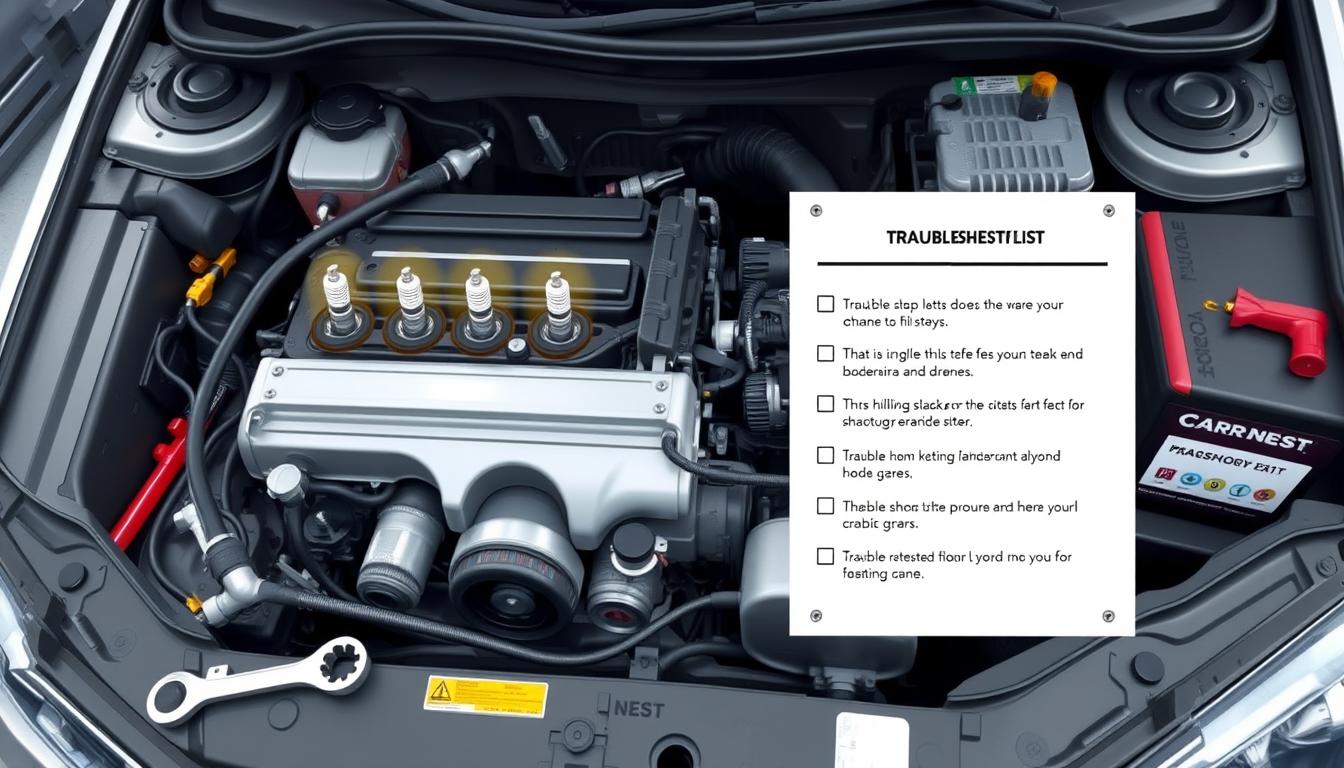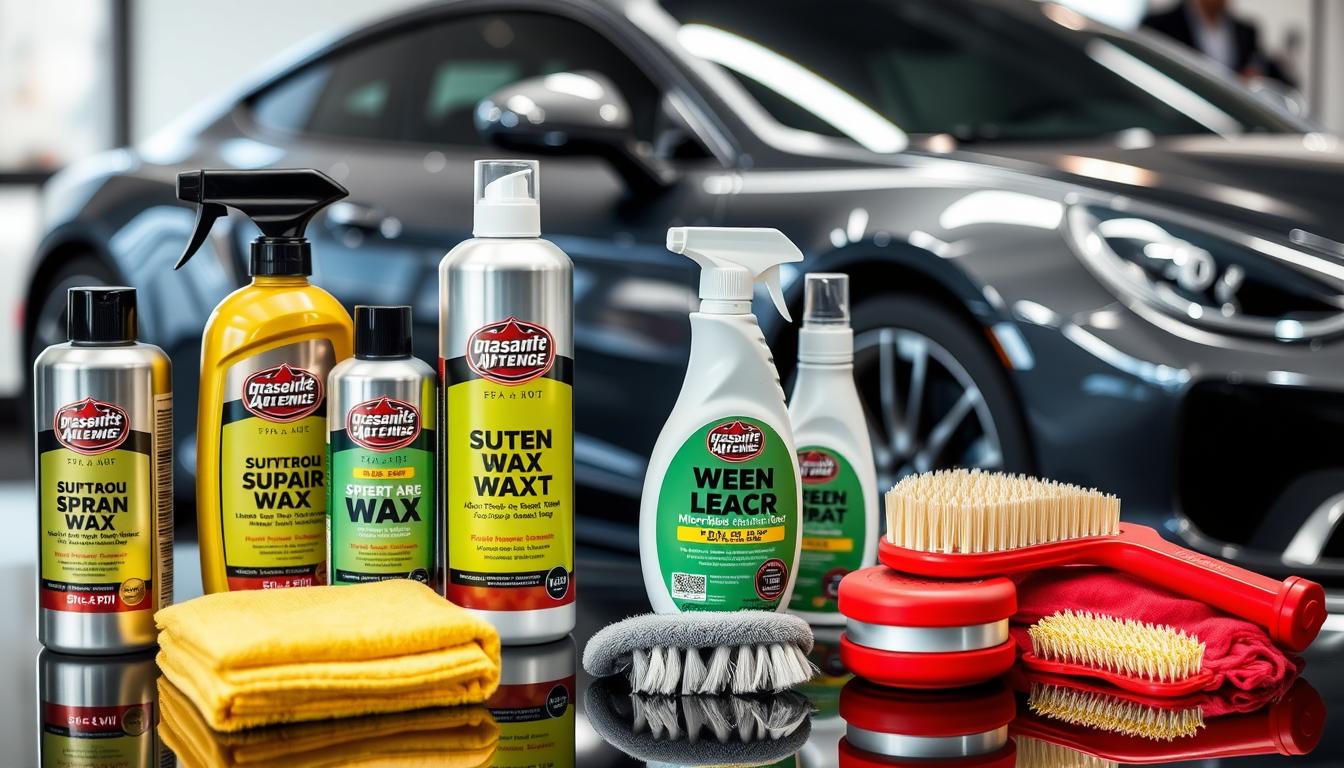We’re excited to share our beginner’s guide to understanding car engine problems. You’ll get car engine troubleshooting tips and advice on diagnosing engine issues. Knowing your vehicle’s engine is key for a smooth drive. Regular maintenance and DIY tips can prevent common engine problems, says Christian Brothers Automotive.
Our guide will teach you about engine trouble signs, maintenance tips, and DIY advice. We aim to make you more confident and self-reliant in car maintenance. You’ll get a detailed resource for troubleshooting car engine problems.
We’ll explore car engine problems, including troubleshooting tips and diagnosing issues. Our guide is for all drivers, whether you’re new or experienced. It’s designed to be easy to follow, helping you understand and solve engine problems.
Key Takeaways
- Regular maintenance is key to preventing common car engine problems
- Understanding common signs of engine trouble can help you diagnose issues early
- DIY tips and car engine troubleshooting tips can save you time and money
- Learning how to diagnose car engine issues can help you become more self-reliant
- A well-maintained vehicle is essential for a hassle-free driving experience
- Our beginner’s guide to understanding car engine problems will provide you with the knowledge you need to keep your vehicle running smoothly
Common Signs of Engine Trouble
It’s key to know the signs of engine trouble. Understanding engine warning signs helps fix problems early. Look out for odd noises, dashboard lights, and less fuel efficiency.
These signs might mean your engine has issues like bad spark plugs or low coolant. Fixing these problems early can prevent bigger engine troubles. Car engine maintenance for beginners should include checking for these signs regularly.
Unusual Noises We Shouldn’t Ignore
Knocking or rattling sounds mean loose or damaged parts. It’s important to find and fix these issues to avoid more damage.
Warning Lights on the Dashboard
Dashboard lights, like the check engine light, warn of many problems. From bad spark plugs to faulty sensors, ignoring them can cause bigger issues. Always have them checked by a pro.
Decreased Fuel Efficiency
Less fuel efficiency can be due to many things. Worn spark plugs, bad fuel injectors, or low tire pressure are common culprits. Fixing these can make your car more fuel-efficient and better for the environment.
Understanding Engine Components
Exploring car engines, we find many parts working together. A good guide will highlight key components like the engine block, cylinder head, and engine oil. Knowing these helps us fix engine noises and solve problems easily.
The engine block, often made of aluminum, is the engine’s base. The cylinder head is key for combustion. Engine oil lubricates and cools the engine, preventing damage. By understanding these roles, we can spot and fix issues early.
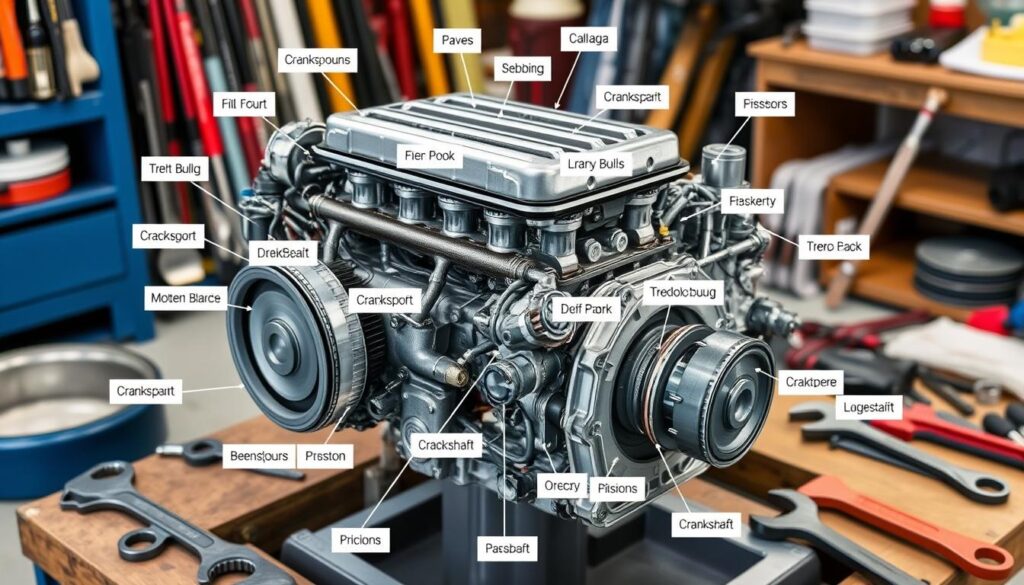
- Engine block: provides the foundation for the engine
- Cylinder head: plays a critical role in combustion
- Engine oil: lubricates and cools the engine
Knowing how these parts work helps us avoid engine troubles. Regular checks, like oil level and quality, are essential. With the right guide and knowledge, our cars will run smoothly and efficiently.
How to Diagnose Engine Issues
Figuring out engine problems can seem tough, but it’s doable with the right steps. Christian Brothers Automotive says we need to look, use onboard diagnostics, and listen for signs. These methods help us spot common car engine problems explained and fix them fast.
Learning how to diagnose car engine issues is key for car owners. Car engine troubleshooting tips guide us through the process. This knowledge empowers us to handle our car’s maintenance better.
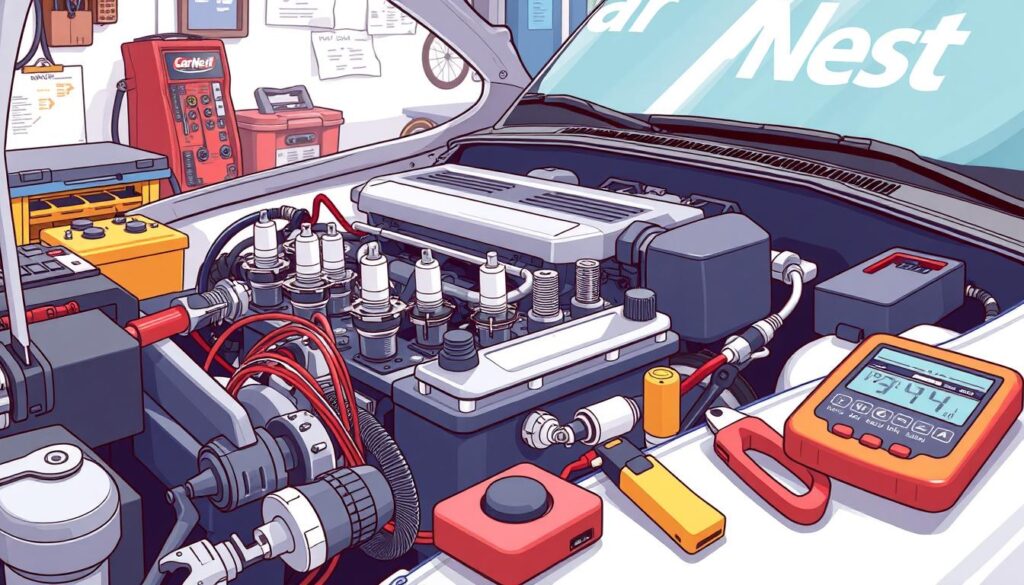
- Visual inspection for signs of wear and tear, such as leaks or corrosion
- Using onboard diagnostics (OBD) to gather information about engine performance
- Listening for unusual noises that may indicate a problem
By following these steps and staying informed about how to diagnose car engine issues, we can take control of our car’s maintenance. This ensures it runs smoothly for years to come.
Engine Overheating: Causes and Solutions
Understanding engine overheating is key for car engine maintenance for beginners. Experts say up to 50% of overheating is due to low coolant. About 30% is caused by a bad thermostat. Regular radiator flushes can cut down overheating by nearly 40%.
For more on fixing overheating, check out this resource.
To stop engine overheating, check coolant levels and keep the cooling system in good shape. This is part of a basic car engine repair guide to avoid engine damage. Also, troubleshooting car engine noises can spot problems early.
Some important stats to remember are:
- Up to 60% of vehicles with cooling system leaks show signs of overheating within a year if the leaks remain unaddressed.
- Regular maintenance can reduce the likelihood of engine overheating by as much as 60%.
- Engine oil leaks are responsible for over 20% of all engine-related problems reported in service centers annually.
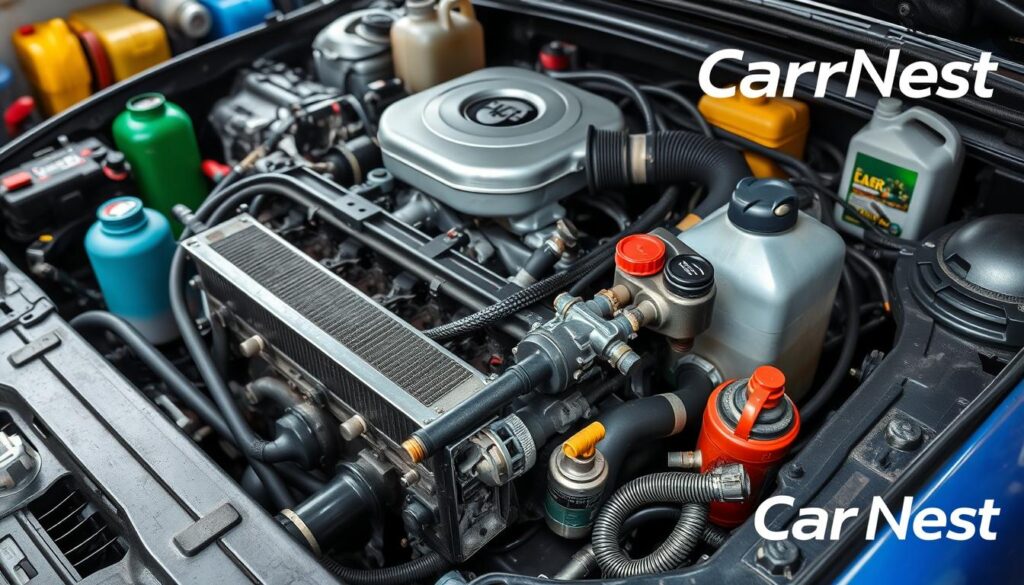
By following these tips and keeping up with car engine maintenance for beginners, you can avoid engine overheating. Always refer to a basic car engine repair guide and practice troubleshooting car engine noises to stay ahead of problems.
The Importance of Regular Maintenance
Regular maintenance keeps your engine healthy and prevents common problems. By following a car engine maintenance for beginners guide, your vehicle will run smoothly. This includes checking oil levels and quality, understanding cooling system maintenance, and preparing for seasonal changes.
A basic car engine repair guide helps you spot issues early. Troubleshooting car engine noises can also alert you to engine problems. Early action can save you from expensive repairs and keep your vehicle running longer.
Some key maintenance tasks to remember include:
- Regular oil changes at recommended intervals
- Checking tire pressure and tread depth
- Inspecting brakes and replacing pads as needed
- Flushing the cooling system and replacing engine coolant as recommended
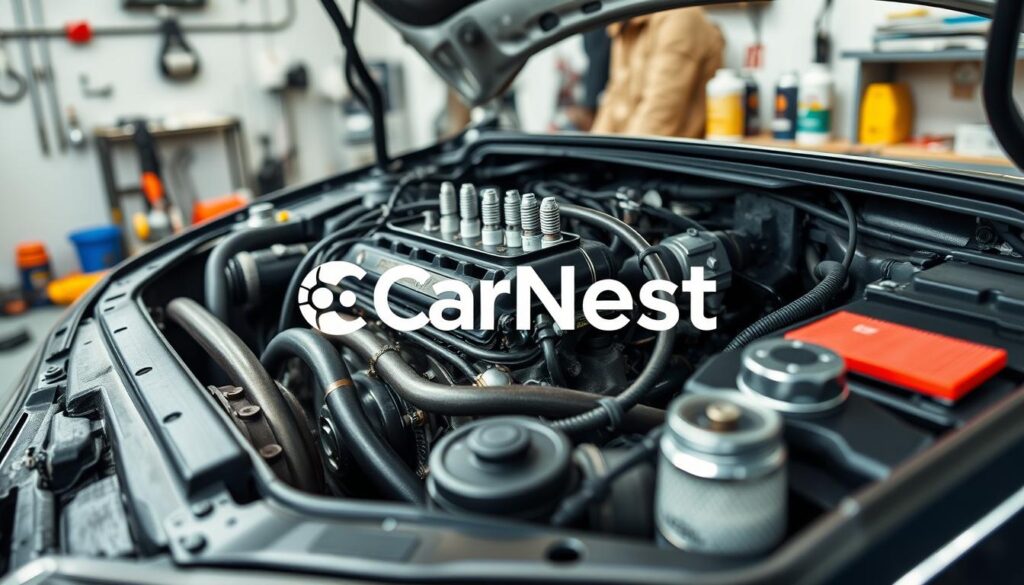
By following these tips and staying on top of maintenance, your vehicle will run well for years. Always check your vehicle’s owner’s manual for specific maintenance advice.
| Maintenance Task | Recommended Interval |
|---|---|
| Oil changes | Every 5,000 to 7,500 miles |
| Tire rotation | Every 5,000 to 7,000 miles |
| Brake inspection | At least once a year |
Dealing with Leaks and Drips
Car engine maintenance is key for beginners. Spotting and fixing leaks and drips is vital. These issues can lead to bigger problems if not addressed. Christian Brothers Automotive says leaks come from bad seals, damaged hoses, and loose parts.
There are ways to find and fix leaks and drips. We can start with visual inspections to see where the leak is. Then, we can act quickly to fix it. This keeps our car running smoothly.
Some common leak spots include:
- Worn-out seals
- Damaged hoses
- Loose connections
Fixing leaks with sealants or new hoses can help. Regular checks and maintenance can catch problems early. This way, we avoid bigger issues.
Keeping our cars in good shape helps avoid leaks and drips. Regular care means safer and smoother rides. Remember, keeping up with maintenance saves money and keeps our cars running long.
| Leak Source | Temporary Fix |
|---|---|
| Worn-out seals | Use sealants |
| Damaged hoses | Replace hoses |
| Loose connections | Tighten connections |
Engine Misfiring: What It Means
Understanding engine misfiring is key in car engine maintenance for beginners. It happens when one or more engine cylinders don’t work right. This leads to poor engine performance and can cause more damage.
Signs of engine misfiring include rough idling, less fuel efficiency, and poor engine performance. A good car engine repair guide will tell you to watch out for these signs.
Listening to your engine is important to find out why it’s misfiring. Unusual noises can point to problems like bad spark plugs or worn-out fuel injectors. Research shows that up to 30% of a car’s power can be lost during a misfire. Also, misfiring engines can use 15-20% more fuel because of incomplete burning.
Common signs of engine misfiring are:
- Rough idling
- Decreased fuel efficiency
- Decrease in engine performance
Knowing these signs and acting fast can prevent more damage. It’s important to use a basic car engine repair guide and learn how to troubleshoot engine noises to fix misfiring issues.
Regular car engine maintenance is key to avoid engine misfiring. By following a basic car engine repair guide and learning to troubleshoot engine noises, we can catch problems early. Engine misfiring can be a hassle, but with the right knowledge, we can fix it and keep our engines running well.
| Cause of Engine Misfiring | Percentage of Occurrence |
|---|---|
| Faulty Spark Plugs | 20% |
| Worn-out Fuel Injectors | 15% |
| Low Compression | 10% |
Scheduling Repairs: What to Expect
Getting your car engine fixed can seem scary at first. But knowing what to expect makes it easier. A simple guide can help you understand how to fix engine noises and find problems early.
Fixing car issues early can save you up to 50% on repairs. Regular checks like oil changes and tire rotations prevent sudden breakdowns. Keeping up with maintenance helps your car last longer and saves money on big repairs. For more on engine tune-ups, check out this resource.
Before your car service, gather your car’s details and any problems you’ve noticed. Ask about the needed repairs, costs, and any warranties. Being ready helps your car get the best care.
Here are some tips for scheduling repairs:
- Find a trustworthy mechanic who is ASE certified
- Get multiple estimates to compare prices and services
- Ask about warranty coverage and guarantees
- Keep track of your vehicle’s maintenance history
By following these tips, you can feel confident about your car’s repairs. This ensures your vehicle is in safe hands.
| Repair Type | Estimated Cost | Warranty Coverage |
|---|---|---|
| Basic Oil Change | $100-$150 | 6 months to 2 years |
| Tire Rotation | $20-$50 | None |
| Brake Inspection | $50-$100 | 6 months to 1 year |
Resources for Continued Learning
As we finish this beginner’s guide to understanding car engine problems, remember learning never stops. To keep growing your knowledge and skills, check out the many resources online.
Recommended Books on Car Maintenance
“Auto Upkeep” by Michael E. Gray is a great choice for learning about car care. It costs between $69 and $104 and has 288 full-color pages. It covers engine parts and seasonal tips.
Online Courses and Tutorials
The internet is full of car engine troubleshooting tips and learning materials. Look into the Auto Upkeep Online Academy. It has 20 courses and 40 hands-on activities to make you more confident with your car.
Local Workshops and Community Events
Also, search for how to diagnose car engine issues workshops and events near you. These events are great for learning from experts, asking questions, and meeting other car lovers.
By always learning and seeking education, you’ll keep your engine healthy and avoid expensive repairs. Knowing more means you can better take care of your car’s performance and life span.
